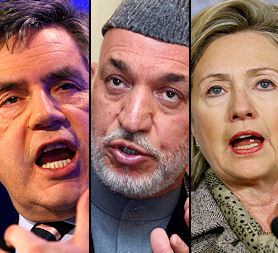The Afghanistan mission comes to London
Updated on 28 January 2010
Afghan President Hamid Karzai and US Secretary of State Hillary Clinton are due to join Gordon Brown in London today for a crucial conference aimed at setting out a mission strategy in Afghanistan.

The meeting is intended to draw up plans for Afghan forces to gradually take over responsibility for growing areas of their country, paving the way for the eventual withdrawal of international troops.
Prime Minister Gordon Brown, who is co-hosting the conference with President Karzai and UN Secretary General Ban Ki-moon, said that at least five Afghan provinces - and some districts of Helmand province - could be handed back to home-grown authorities by the end of this year.
Although Mr Brown has set no timetable for the return of British troops, the target is to start handing over security to Afghan forces is 2011.
The international military presence in Afghanistan is reaching its highest level since the toppling of the Taliban in 2001.
Gordon Brown, speaking on this morning's Today programme on BBC Radio 4, said that any future negotiations with the Taliban would be "conditional on strengthening the Afghan forces... The first thing is to strengthen the Afghan forces, then to weaken the Taliban by dividing them."
On the same programme, Afghanistan's President Karzai stressed that negotiations would only take place with "Taliban who are not part of al-Qaida... who accept the Afghan constitution... and will be persuaded by all peaceful means to return to Afghanistan and lay down their arms and become part of the Afghan community once again."
Gordon Brown agreed: "Most of them (the Taliban) have different reasons for being part of this insurgency. Some are ideologically committed... but some are mercenaries, some have local tribal grievances."
And he stressed: "There is no reconciliation with the al-Qaida element... (which is) a perverted expression of Islam."
President Karzai also predicted that today's conference would "emerge with a clear agenda for the next five years for more trained army and police, with an adequate number, towards institutionalisation, better economic effort in Afghanistan.
We went on: "Most important of all, (I expect) a plan for reconciliation and free integration that will be backed, I hope, by the international community."
Last year US President Barack Obama announced an extra 30,000 American troops would be sent to the country. Britain's deployment is due to rise to 9,500.
Mr Karzai has already accepted international targets to boost his army to 134,000 and police to 90,000 this year, and may go further tomorrow.
Around 70 countries will be represented in London tomorrow, including those contributing troops to the International Security and Assistance Force, neighbours of Afghanistan and other regional powers.
Iranian media reported yesterday that it would not be taking part in the London summit. Iran's foreign ministry spokesman said the decision was "because the meeting's approach is towards increasing military action… and because it does not take into consideration the region's capacity to solve the problems," the Fars news agency reported.
Reintegrating the Taliban
Nato's new civilian representative in Kabul, British diplomat Mark Sedwill, earlier predicted that the alliance will have troops in Afghanistan, probably including British troops, "for 10 to 15 years".
International troops would continue in a combat role for three to five years, before shifting their focus to mentoring Afghan soldiers, he said.
His appointment came as part of a wide-ranging overhaul of strategy and operations, focusing on tackling corruption, beefing up the national army and police and improving the lives of ordinary Afghans to prevent them turning to the Taliban.
High on the agenda at the conference will be efforts to reintegrate former Taliban insurgents into mainstream society.
The UN said this week that five former Taliban officials had been taken off a sanctions list, something President Hamid Karzai has been pushing for as well as his plan to reintegrate Taliban foot soldiers.
Yesterday a key Afghan mediator said if the West is serious about wanting to talk to the Taliban about a peace deal it must set up a firm timetable for withdrawing troops and move top leaders off a terrorism blacklist.
Arsala Rahmani, a former minister under the Taliban who has mediated between the Afghan government and Taliban leaders, said: "[Withdrawal] is not only the demand of the Taliban and the opposition, but also of the whole nation that the presence of foreigners who are here has to be legalised."
"It certainly will have a big impact if they set a [withdrawal] timetable and specify their goals as to why they have come here," he told Reuters.
Channel 4 News Asia correspondent Nick Paton Walsh said negotiations with the Taliban could become a priority to stabilising Afghanistan.
"The ground is quite simply being set for a political deal with the Taliban; the hope being moderates will join the government, extremists will feel marginalised," he said.
"You could call it 'Taliban lite' - eventually Kabul could be fronted by the faltering Mr Karzai (after two attempts he has still not managed to get parliament to endorse his cabinet) and power held by a clique of warlords and former insurgents.
"Violence could ebb and more importantly a stability will emerge in which the existence of government - of some sort of state - will pragmatically take precedence over the quality of daily life created.
"This is what Britain has been advocating for almost a year now fuelled by a dose of realism, the massive collapse of British popular support for the war and imminent elections.
"And it is what the 28 January super-conference in London is all about."
Read his article in full here.



